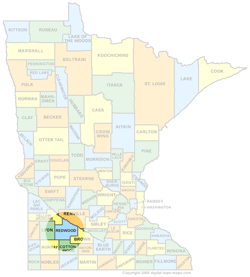Monticello FiberNet Attempts to Adapt Business Plan
“It stopped us from really building the system by about a year,” said Finance Director Tom Kelly, “which put our revenue collections about a year behind.
“It stopped us from really building the system by about a year,” said Finance Director Tom Kelly, “which put our revenue collections about a year behind.
 The Times-Call has a hopeful reflection about the broadband battle (somewhat classier than the hilarious Neener Neener Neener poke at Comcast).
The Times-Call has a hopeful reflection about the broadband battle (somewhat classier than the hilarious Neener Neener Neener poke at Comcast).
This time, lobbyists for the telecommunications industry spent even more than they did last time -- about $300,000 -- in trying to convince residents that the city having control over its own property was somehow "risky." Obviously, the lobbyists, including the euphemistically monikered Americans for Prosperity, were only concerned about the welfare of Longmont residents and the health of the local economy. They spent so much money to show just how concerned they were. But the majority of the voters weren't buying what they were selling. People had the audacity to think for themselves and make up their own minds. Personally, I would thank the anti-2A folks for pouring so much money into the local economy, except most of its spending was elsewhere. They did pop for a few ads in this newspaper, though, so for that they have my gratitude.The author, Tony Kindelspire, goes on to note just how amazing it was to see everyone unified on an issue.
Albert Lea, a town of 18,000 in southern Minnesota, transitioned from getting its Internet access from a private ISP to its County, Freeborn. This is part of a larger IT collaboration between the local governments.
Previously, the community was paying $95/month for a 3Mbps DSL connection from a local private company (the options from the telephone and cable incumbents were even more expensive, offering less value). Now Freeborn County is providing a connection of at least 25Mbps for $150/month -- however the connection regularly offers connections over 50Mbps.
There is an upfront cost of $9,000 to make this switch, which pays off in less than 2 years (local governments often fail to make smart investments that have longer break-even windows because of how they budget for capital vs. ongoing costs). After it breaks even, Albert Lea says it will save $6,000 a year.
Local governments will need broadband connections as long as they exist, meaning that leasing connections from a private party is often fiscally irresponsible. Better to own it or work with another community provider that prices its service closer to the cost of actual provisioning rather than marking it up to reflect a scarce market.
Kevin O’Grady, a staffer for the Public Utilities Commission, called Thursday’s 5-0 vote “uneventful.” He said that aside from a protest from the Minnesota Cable Communications Association that was withdrawn just before the vote, the application was “nothing out of the ordinary.” The cable association, which faces competition from the fiber project, had complained that the county, without a public vote, couldn’t be the legal authority to provide telecommunications services under Minnesota law. The commission, responding to the complaint, said the authority would be granted to Lake Communications, which it deemed had a proper relationship with the county in providing the service. … The county plans to build the network and lease the lines to Lake Communications for revenue. In its original response to the cable association’s complaint, the state commission said Lake Communications’ application “complies with the requirements typically applied by the commission to applications” across the state. It also stated that Lake Communications’ financial statements were “sufficient and consistent with the financial information filed by other applicants for authority.”Remember that Minnesota law requires a supermajority vote of 65% before cities and counties provide telephone service. In this case, Lake Communications will be offering the services on infrastructure owned by the County. If there is any sliver of a doubt about the legality of this arrangement, we can expect Mediacom or the Minnesota Cable Communications Association to file suit.
Redwood County’s Economic Development Authority (EDA) opted to move forward with a broadband feasibility study that would determine just what the county would need to do in order to get fiber to every premises. … The study, which is being conducted by the Blandin Foundation through what is known as the Robust Broad-band Networks Feasibility Grant Program. The grant, which includes up to $40,000 for the county as it addresses the needs of every community and farm site from one end of the county to the other, requires matching funds, which are available through the county EDA.
 Redwood County is in an interesting area, just north of the Windom area muni FTTH networks and west of the proposed project in Sibley and Renville counties. This study comes not long after Todd County started a feasibility study as well (the the latest on that). And though we haven't discussed it much on MuniNetworks.org, Lac qui Parle County to the northwest is working with a rural telephone cooperative to bring FTTH to many in their border as well.
And then beyond them, we have Cook County going FTTH with their electric coop and Lake County going its own way, both with the assistance of the broadband stimulus awards.
Minnesota could very well become the state with the most impressive rural connections. Unfortunately, thus far we have seen no assistance from the state in this matter, but perhaps the Dayton Administration will chart a new course.
Redwood County is in an interesting area, just north of the Windom area muni FTTH networks and west of the proposed project in Sibley and Renville counties. This study comes not long after Todd County started a feasibility study as well (the the latest on that). And though we haven't discussed it much on MuniNetworks.org, Lac qui Parle County to the northwest is working with a rural telephone cooperative to bring FTTH to many in their border as well.
And then beyond them, we have Cook County going FTTH with their electric coop and Lake County going its own way, both with the assistance of the broadband stimulus awards.
Minnesota could very well become the state with the most impressive rural connections. Unfortunately, thus far we have seen no assistance from the state in this matter, but perhaps the Dayton Administration will chart a new course.“I think [the LMCC executive committee] realized that if a municipal fiber network is ever going to be built, the cities need a considerable amount of time spent in educating and understanding the significance of building such a system,” said a memo from Sally Koenecke, LMCC executive director. The $81 million proposal sought to provide 25,000 households in communities from the 17 member cities with Internet, phone and cable fiber optic services.I have occasionally offered technical advice to this ambitious project and have watched as Mediacom and other incumbent providers spread rumors and lies to disrupt it. These companies will stop at nothing to preserve the limited competition they rely upon to maintain their market power.
“I’m personally against spending any money on the fiber optic project,” said Orono mayor Lili McMillan. “What I want to do is send a message. I don’t feel government should be in this.”To be clear, if Lili McMillan doesn't want the government to build a next-generation network, they will have to continue relying on Mediacom cable and slow, unreliable DSL services. Their choice. Their incumbents do not have the capacity or interest to build a next-generation network themselves but they do have the capacity and interest to prevent any other party from doing so. As Ann Treacy notes at Blandin on Broadband, this is not necessarily the end of the line and may actually serve to increase the desire of people in those communities to take action:
Unfortunately I think that having interest if the price is low enough might not be enough to motivate a community through the perils of community supported fiber. But I always remember the folks in Monticello saying that each set back in winning over the residents just made them stronger in the end.